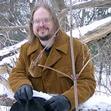Sentimental Journey: An Abandoned House

Chuck Evans/Creative Commons
The house had been bulldozed. Elms, dead of drought, ringed the dusty flat where it should have stood. Boughs had been piled into a wild desiccated pyre. My father stood tracing the floor plan of the farm by the few unburied signs: A round slab of cement lay where the granary had stood. The front walk remained, in rubble. The cattle pens and corral were mostly gone, but the chute remained, as if to convey a steer from the ground into airy nothing. (Or a child, for my sister and I had run up that chute many times.) I wandered the place, amazed. It was a mere toy to the landscape in my memory. That road from farmhouse to granary, the one where I’d seen my first rattlesnake flattened and grinning its crooked dead grin, the one where my grandfather had decapitated a much greater rattlesnake and it had with the weeks dried to rib and spine and become tangled in the grasses of the ditch and somehow become nothing at all—that epic road was now only a few paces.
I wandered. Those
peculiar weeds with the yellow berries jutted from the soil; I broke off a
berry and punctured its eggshell rind. There was no moisture inside, only a
bitter smell. And then I saw the hole, just big enough for a man. In my
childhood dreams the prairie had held, just beyond my wanderings, exactly such
apertures into subterranean depths—the hiding places of ghouls and glistening
snakes, the homes of women who shone like angels in white gowns. But those were
only dreams and the games I elaborated from them. This one was real. I lay on
my belly and looked down six or seven feet. Down there clods of mud had dried
into monstrous shapes. A pipe protruded like a fractured leg bone. A tunnel
stretched away to the west, further than I could see.
“I think I found the
cellar,” I said. Memories of it crowded in—my parents’ wedding album floating
in a flood; a nest of mice blind in one corner; a bull snake, woken from winter
sleep, clunking up the stairs, using the frozen loop of himself as a sort of
foot.
“No,” my father said,
for he had already deduced that the house itself now occupied the cellar. He
pointed out the clues he’d noted on the terrain. The cellar had been over there.
Nor was this hole and its tunnel part of the septic tank, which had lain on the
far side of the house. I wanted it to be the cellar, that humid haven of
memory, but I knew he was right. “It must be an older septic tank,” he said.
One used and then capped before we’d ever known the place, more ancient even
than the memories that had been writhing within me, trying to fit themselves
into these tiny marks on the landscape. Only the bulldozing of the house had
finally revealed this older tank. I drew back at the thought of this tunnel contaminated
with sewage, but that was absurd; the earth had had decades to digest it.
Something an arm’s
length down caught my eye. It was a web. The pattern was more familiar to me
than the floor plan of this little farm. I reached cautiously; in Oklahoma, the
black widows may still be alive in November, depending on the weather’s whims.
My finger plucked a strand, broke it. The sound I wanted to hear didn’t come. It
would have been a confirmation of the spider’s identity, though I should hardly
need that. It would have been more than information, however; it would have
given me some comfort, for I spent my childhood in pursuit of widows. The child
within me would have taken the tearing sound with joy, and the man, long
removed from his natural habitat, felt the same.
The absence of the
characteristic sound might mean the widow’s web was old, had lost its
elasticity. Or it might mean this was not the work of a widow, but of some
similar species, like the American house spider. The answer mattered to me more
than I can perhaps make clear. I was an absurd middle-aged man crawling on his
belly, poking into an old septic tank. But I was also looking into memories,
into childhood dreams, into the very earth I’d come from. I don’t believe in
signs, but I wanted to see one. I writhed forward, pushing my shoulders into
the hole. Under the thick lip of earth, the web hung in ragged elegance like
dirty lace. The strands were too old and loose; I would not hear them tear like
paper; this was the work of an earlier year, and the spider was gone, probably
dead. But I knew she was a widow. She had left the blunt husk of a scarab
hanging there, a beetle too big for any other spider’s web.

Published on August 21, 2012 01:30
No comments have been added yet.





